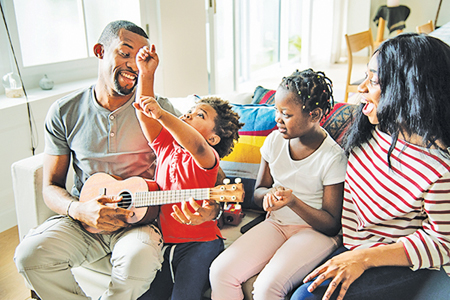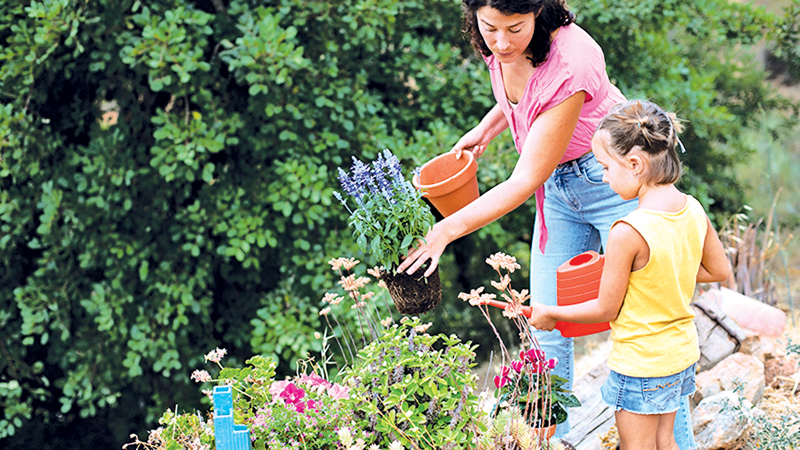Stress has become a common thread in the fabric of modern life. From endless notifications and work deadlines to the pressures of social media and personal responsibilities, we live in a constant state of mental noise. But the answer to managing stress doesn’t always lie in expensive therapy sessions or digital detoxes in faraway places.
Sometimes, it’s right under our noses and found in the soil of our gardens, the rhythm of housework, the scent of something simmering in the kitchen, or the quiet laughter shared at a family dinner table.
These everyday activities that are often dismissed, as chores or mundane routines hold a surprising potential to heal, ground, and refresh us. They slow us down, reconnect us with our senses, and remind us that life is not just about chasing tasks but also about feeling present in the moment.
Gardening for grounding
Gardening is more than planting flowers or growing vegetables. It’s an act of mindfulness. As hands dig into the soil, stress begins to slip away. The fresh air, the textures of leaves, the smell of earth, and the slow magic of watching something grow all combine to create a calming experience. Studies have shown that gardening can lower cortisol levels, the hormone linked to stress.
Being in touch with nature, even in a small balcony garden or with a few potted herbs by the window, can give a sense of purpose. Plants don’t rush, and they don’t expect perfection. Their slow growth reminds us to be patient with ourselves. Gardening also encourages physical movement, which releases endorphins, the body’s natural mood boosters. It’s a quiet, unhurried ritual that doesn’t demand performance, just presence is needed.
Housework brings structure
While chores may feel like burdens on a busy day, housework can become a form of therapy when approached with the right mindset. Sweeping a floor, folding clothes, or washing dishes may not be glamorous, but these acts provide structure. In a chaotic world, having control over your environment can be deeply reassuring.
Repetitive tasks like ironing or dusting offer a rhythm that allows the mind to unwind. Instead of letting thoughts race, these motions bring attention back to the body. The sight of a clean room or freshly made bed offers a small, but real, sense of accomplishment. That visual order translates into internal calm.
Cleaning can also be symbolic. When we declutter a room, we often find our minds decluttering too. Letting go of old or unused items sometimes makes space for mental clarity. The home becomes not just a shelter but a sanctuary.
Culinary wonders
Cooking has long been a source of comfort. From kneading dough to chopping vegetables, preparing a meal can be a creative outlet and a source of joy. It allows us to express care for ourselves and for others. The kitchen becomes a place where the senses come alive: the sizzling of oil, the aroma of spices, the feel of textures, the vibrant colours of ingredients.
Cooking for loved ones is one of the most natural forms of giving. Sharing a meal is not just about nutrition – it’s about connection. Even the simple act of making a cup of tea for someone can carry warmth far beyond the drink itself.
Unlike many things in life, cooking has a clear beginning, middle, and end. You start with raw ingredients and end with a finished dish. This sense of completion can be deeply satisfying when much of modern life feels open-ended and unresolved.
What matters most
In the rush of daily life, it’s easy to forget the value of spending time with the people who care about us most. Family get-togethers no matter whether large reunions or simple dinners, they create a space where we can let our guard down. Conversations, shared memories, inside jokes, or even shared silences help us feel rooted and less alone.
Spending time with family doesn’t always have to be structured. Sitting together after dinner, playing a board game, or simply chatting over tea can remind us of the basics: we belong, we’re supported, and we’re heard. These moments are soft cushions for the mind.
Even if family isn’t always biological, spending time with trusted friends, chosen family, or close neighbours can have the same effect. It’s the togetherness that counts, not the titles.
Unplugging from digital distractions
 Part of what makes these simple activities effective is that they pull us away from screens. Whether it’s television, smartphones, or computers, our digital lives keep our minds overstimulated. Notifications, scrolling, and comparison culture drain our attention spans and increase anxiety.
Part of what makes these simple activities effective is that they pull us away from screens. Whether it’s television, smartphones, or computers, our digital lives keep our minds overstimulated. Notifications, scrolling, and comparison culture drain our attention spans and increase anxiety.
When you’re gardening, vacuuming, or stirring a pot, the digital world pauses. The mind shifts from being plugged in to being present. These moments without screens give our brains time to rest. We stop reacting and start simply being.
Choosing analog tasks over digital noise doesn’t mean giving up technology, but rather, rebalancing how we spend our time. It’s about weaving back moments of stillness and attention into a life that’s otherwise fragmented.
Physical movement improves mood
Whether it’s bending to plant seeds, reaching to dust a shelf, or walking across a kitchen as you cook, these activities get the body moving. You don’t have to go to a gym to reap the mental benefits of movement. Light physical activity improves blood circulation, reduces tension, and helps regulate sleep.
Many people feel trapped in their heads during stressful periods. Physical tasks help anchor us. Moving our bodies shifts our focus away from worries and into the present. We may not even notice how much tension we’re carrying until we stretch, lift, or move.
These movements also connect us to a sense of purpose. Our actions feel useful—not performative or pressured, but genuinely needed and appreciated. That in itself is grounding.
Creative pastimes
Beyond these core activities, pastimes such as sewing, drawing, knitting, journaling, or doing a puzzle can also be powerful stress relievers. These hobbies don’t have to be perfect or productive. Their beauty lies in the fact that they are personal and voluntary. There is no competition, no deadline, so just the joy of doing.
Creative tasks use different parts of the brain and help us process emotions. They allow expression, reflection, and discovery. In a world that often asks us to consume, these hobbies ask us to create.
We often chase grand solutions to fix our stress. But peace can lie in the familiar, in the quiet gestures of daily life. Gardening, cleaning, cooking, or sitting down with loved ones don’t just fill time, they fill us. They bring balance back to our minds and bodies.
We don’t always need to escape life to feel better. Sometimes, we just need to live it more slowly, more consciously, and more kindly. When we embrace the calm of these everyday rituals, we find that healing doesn’t always roar. Sometimes, it’s a whisper in the garden, the scent of a home-cooked meal, or the sound of laughter from the next room.







